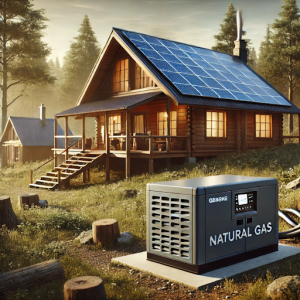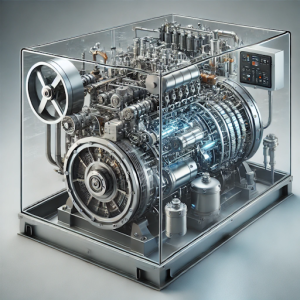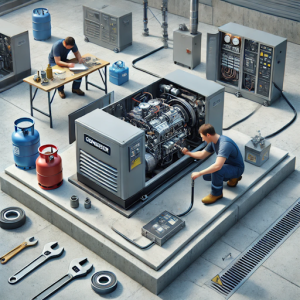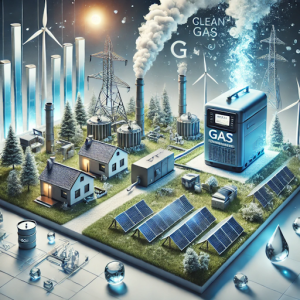Discover How Natural Gas Generators Enhance Sustainable Off-Grid Living
Natural gas generators are increasingly recognized as an excellent solution for individuals seeking a dependable energy source for homes or cabins in remote locations. To embark on a fruitful off-grid journey, it’s essential to grasp the various methods of power generation available. The unique benefits of natural gas generators—including their reliability, economic efficiency, and environmentally friendly characteristics—make them an appealing choice for those invested in a sustainable and efficient off-grid lifestyle. By opting for natural gas, you not only secure a consistent power supply but also contribute to a greener planet.
In our technology-driven era, the concept of off-grid living has gained significant traction among many individuals. Whether driven by a desire for sustainability, personal independence, or the pursuit of a self-sufficient lifestyle, disconnecting from the traditional power grid can offer tremendous satisfaction. Embracing off-grid power solutions allows you to harness energy from renewable resources or alternative fuels, ultimately leading to a comfortable living experience that is independent of conventional electricity sources.
By arming yourself with the necessary knowledge and preparation, you can smoothly incorporate a natural gas generator into your off-grid lifestyle, ensuring that your essential needs are consistently fulfilled with a reliable source of electricity. This article will delve into the extensive benefits of natural gas generators, clarify their operational principles, and highlight key considerations for selecting and installing them effectively within your off-grid framework.
 Empower Your Off-Grid Power Solutions with Essential Insights
Empower Your Off-Grid Power Solutions with Essential Insights
- Off-grid power solutions liberate you from conventional energy sources, making them indispensable for remote living or during unforeseen power outages.
- Natural gas generators deliver reliable and efficient energy production, with significantly lower emissions when compared to diesel or gasoline counterparts.
- These generators function by combusting natural gas to generate mechanical energy, which is subsequently converted into electrical energy through a generator system.
- When selecting a natural gas generator, it’s essential to assess factors such as power output, fuel efficiency, and maintenance requirements to ensure optimal performance.
- Proper installation and regular maintenance are crucial for the safe and efficient operation of your natural gas generator.
Uncover the Outstanding Benefits of Natural Gas Generators for Power Generation
A standout feature of natural gas generators is their remarkable reliability. By choosing a natural gas generator to meet your off-grid energy needs, you can rely on a stable power supply tailored to your specific requirements. Unlike solar panels or wind turbines, which can be adversely affected by shifting weather patterns, natural gas generators provide consistent energy output that remains unaffected by external conditions.
This reliability is especially vital for those who depend on electricity for indispensable operations such as heating, refrigeration, or running medical devices. Knowing that your generator will deliver power during critical moments provides invaluable peace of mind. Beyond their reliability, natural gas generators also offer significant financial advantages, making them a smart investment for off-grid living.
Although the initial costs may be higher than some alternative off-grid solutions, the long-term savings can be considerable. Natural gas is generally more economical than gasoline or diesel, leading to lower operational expenses over time. Additionally, natural gas generators tend to have less demanding maintenance requirements compared to other fuel types, allowing you to conserve both time and resources while enjoying a consistent energy source.
 Understanding the Operational Mechanics of Natural Gas Generators
Understanding the Operational Mechanics of Natural Gas Generators
Natural gas generators convert the chemical energy stored in natural gas into electrical energy through a combustion process. When activated, natural gas is combined with air and ignited in the engine’s combustion chamber. This ignition produces high-pressure gases that propel the engine’s pistons, ultimately rotating the generator’s rotor and generating electricity.
This operational method is noteworthy for its efficiency, as it is cleaner compared to other fossil fuel alternatives available on the market. A crucial component of a natural gas generator is its fuel system, which typically includes a regulator to manage the gas flow and ensure peak performance. Modern natural gas generators come equipped with advanced features such as automatic start/stop functions and remote monitoring capabilities.
These innovations significantly enhance user convenience, allowing you to manage your power supply more effectively and simplifying your off-grid experience.
Key Considerations for Selecting the Perfect Natural Gas Generator
| Consideration | Description |
|---|---|
| Power Output | Evaluate the generator’s power output requirements based on the appliances and equipment you intend to operate. |
| Fuel Type | Opt for natural gas as your fuel choice due to its clean-burning and cost-effective properties. |
| Size and Portability | Choose a generator size and portability that align with your available space and mobility requirements. |
| Noise Level | Assess the generator’s noise output to ensure it meets the acceptable standards for your living environment. |
| Start-up Mechanism | Choose between manual or automatic start-up options based on your convenience and frequency of use. |
When selecting a natural gas generator for your off-grid setup, there are several critical factors to consider. First, assess your power requirements accurately. Calculate the total wattage needed to support your essential appliances and devices, ensuring that your chosen generator can handle the load effectively.
It’s advisable to select a generator with a slightly higher capacity than your calculated needs to account for any sudden spikes in power demand. Another vital aspect to examine is the generator’s portability and installation requirements. If you plan to move your generator frequently or utilize it in different locations, look for a lightweight and easily transportable model.
Moreover, consider whether you prefer a stationary installation or a portable unit that can be conveniently set up according to your preferences. Lastly, pay attention to the generator’s noise level; opting for quieter models can significantly enhance your off-grid experience by minimizing disruptions and preserving the tranquility of your natural surroundings.
 Best Practices for Installing and Maintaining Natural Gas Generators
Best Practices for Installing and Maintaining Natural Gas Generators
Installing a natural gas generator requires meticulous planning and execution to ensure both safety and efficiency. Begin by choosing an appropriate installation site for your generator, ensuring compliance with local regulations and safety standards. Ideally, this location should have ample ventilation and be situated a safe distance from flammable materials.
You may also need to construct a concrete pad or platform to stabilize the generator and protect it from moisture damage. Once you’ve identified the optimal location, connect the generator to your natural gas supply line. If you’re unfamiliar with gas line installations, it’s advisable to seek professional assistance to guarantee compliance with all safety standards.
After establishing the fuel connection, set up the necessary electrical connections to integrate the generator with your home’s electrical system. Regular maintenance is essential for ensuring your generator operates efficiently. This encompasses routine checks of oil levels, air filter replacements, and spark plug inspections to maintain peak performance and longevity.
Cost Analysis: Natural Gas Generators Compared to Other Off-Grid Power Options
When assessing the costs associated with off-grid energy solutions, it is crucial to perform a comprehensive comparison between natural gas generators and alternative options like solar panels and diesel generators. Despite solar energy systems being lauded for their renewable qualities, they often necessitate a substantial initial investment in panels, batteries, and inverters. Additionally, solar systems can struggle to deliver adequate power during cloudy days or nighttime unless supported by sufficient battery storage.
On the other hand, diesel generators are recognized for their reliability, but they come with higher fuel expenses and more frequent maintenance demands compared to natural gas generators. Since diesel fuel prices can vary significantly, natural gas typically presents a more stable and often lower-cost alternative in numerous regions. A long-term cost analysis indicates that natural gas generators usually provide a more economical solution for those committed to off-grid living.
 Assessing the Environmental Impact of Natural Gas Generators in Off-Grid Scenarios
Assessing the Environmental Impact of Natural Gas Generators in Off-Grid Scenarios
As you evaluate your off-grid energy options, it is essential to consider their environmental impact. Natural gas is often marketed as a cleaner alternative to other fossil fuels, such as coal or oil, due to its lower carbon emissions during combustion. By choosing a natural gas generator, you can significantly reduce your carbon footprint while enjoying reliable power for your off-grid lifestyle.
However, it is important to recognize that natural gas remains a fossil fuel, and its extraction can lead to environmental issues. Methane leaks during the extraction and transportation processes present serious concerns when it comes to greenhouse gas emissions. To address these challenges, prioritize sourcing natural gas from reputable suppliers who are committed to sustainable practices.
Additionally, incorporating renewable energy sources alongside your natural gas generator can further illustrate your commitment to environmental sustainability and responsible energy consumption, making your off-grid setup even more eco-friendly.
Inspiring Real-Life Examples of Off-Grid Power Solutions Using Natural Gas Generators
Examining real-world cases offers valuable insights into the effective use of natural gas generators in off-grid living situations. For example, numerous rural homeowners have successfully transitioned to natural gas generators as their primary power source after experiencing persistent outages from traditional utility services. The implementation of these generators has enabled them to achieve energy independence while ensuring consistent electricity for heating, cooling, and essential appliances.
Another notable case study involves remote cabins that utilize natural gas generators for seasonal use. Due to their isolated locations, these cabins commonly lack access to conventional power sources. Natural gas generators allow cabin owners to enjoy modern conveniences such as refrigeration and lighting without compromising their connection to the pristine natural environment.
These success stories demonstrate how natural gas generators can effectively support off-grid living, providing comfort and reliability. As you begin your journey toward off-grid living, consider the extensive advantages that natural gas generators present. From their dependable performance and cost-effectiveness to their relatively low environmental impact, these generators can play a crucial role in achieving energy independence.
By carefully choosing the right model for your specific needs and adhering to proper installation and maintenance guidelines, you can smoothly transition into a fulfilling off-grid lifestyle powered by natural gas.
Frequently Asked Questions About Natural Gas Generators
What is a natural gas generator for off-grid applications?
A natural gas generator for off-grid living is a power generation system that uses natural gas as a fuel source to produce electricity in remote locations where access to the main power grid is limited or unavailable.
How does a natural gas generator work for off-grid use?
A natural gas generator designed for off-grid applications operates by combusting natural gas within an internal combustion engine. This process generates mechanical energy, which is then converted into electrical energy via a generator. The electricity produced can power various appliances, equipment, and lighting in off-grid settings.
What are the primary benefits of using a natural gas generator for off-grid living?
Key advantages of utilizing a natural gas generator for off-grid living include:
– Lower fuel costs compared to diesel or gasoline generators
– Cleaner combustion resulting in reduced emissions
– Continuous fuel supply sourced from natural gas pipelines
– Reduced maintenance requirements relative to other fuel types
What factors should be considered when utilizing a natural gas generator for off-grid living?
Important considerations when using a natural gas generator in off-grid scenarios include:
– Availability of natural gas supply in your area
– Initial installation and equipment costs
– Regular maintenance and servicing needs
– Environmental implications and compliance with emissions regulations
Is using a natural gas generator off-grid feasible for residential and commercial purposes?
Natural gas generators intended for off-grid use are suitable for both residential and commercial applications. They are commonly employed in remote homes, cabins, farms, and small businesses lacking connectivity to the main power grid.
The post Natural Gas Generators for Off-Grid Power Solutions appeared first on Survival Bite.
The Article Natural Gas Generators: Your Off-Grid Power Solution Was Found On https://limitsofstrategy.com

Your exploration of natural gas generators in the context of sustainable off-grid living raises some interesting points, particularly about their reliability and economic efficiency. However, I think it’s worth delving deeper into the implications of relying on natural gas, especially when discussing sustainability.
You raise a really important point about the implications of relying on natural gas generators in discussions about sustainability. While they do offer a reliable power source for off-grid living, there’s definitely a trade-off to consider. Natural gas, while cleaner than coal or oil, still contributes to greenhouse gas emissions.
You bring up a really important point about the implications of relying on natural gas, especially in the context of sustainability. While it’s true that natural gas is often touted as a cleaner alternative to other fossil fuels, we have to consider the entire lifecycle and its impacts on the environment. For example, methane, which is the primary component of natural gas, is a potent greenhouse gas. Even small leaks during extraction and transportation can significantly undermine its advantages.
You’ve highlighted a crucial aspect of the conversation around natural gas. While it often gets positioned as the “cleaner” fossil fuel, the reality is much more complex. Methane’s potency as a greenhouse gas—being significantly more effective at trapping heat than carbon dioxide over a shorter period—means that even minimal leaks can have outsized consequences for our climate goals.
You’re spot on about the complexities of natural gas and its role in sustainability. It’s easy to focus on the immediate benefits without considering the bigger picture. Methane’s potency as a greenhouse gas should definitely raise red flags for us. Just a small leak can undo the progress we hope to make in reducing emissions.
You’ve touched on a crucial aspect of the conversation around natural gas generators. While they offer reliability and efficiency, the sustainability angle does raise some eyebrows. Natural gas is often seen as a “bridge” fuel, cleaner than coal or oil, but it’s not without its drawbacks. The extraction process can have significant environmental impacts, not to mention the methane emissions that can occur during production and transport.
You’ve definitely hit the nail on the head regarding the duality of natural gas as a bridge fuel. It’s sort of a paradox, isn’t it? On one hand, the reliability and efficiency it provides can be quite compelling, especially as we transition away from more polluting fossil fuels. However, the sustainability concerns you mentioned are hard to overlook.
I really enjoyed reading your insights on natural gas generators and their role in sustainable off-grid living. It’s fascinating how modern technology can enhance our ability to live more independently while still being conscious of our environmental impact.
I really appreciate your insights on natural gas generators for off-grid living! It’s fascinating how these technologies are shaping a more sustainable lifestyle, especially for those of us drawn to independence and self-sufficiency. I’ve been considering setting up a small cabin in the woods, and the idea of having a reliable power source without being tied to the grid is really appealing.